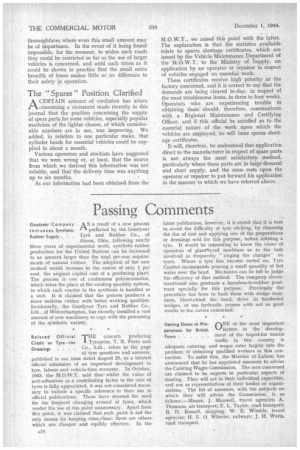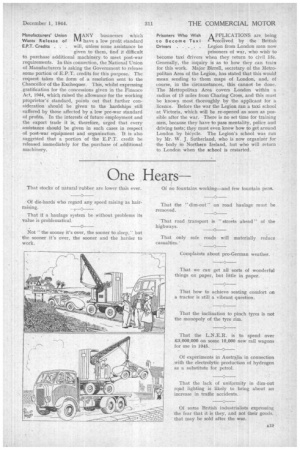Passing Coinments
Page 20

Page 21

If you've noticed an error in this article please click here to report it so we can fix it.
Goodyear Company A S a result of a new process Increases Synthetic 1-1 perfected by the Goodyear Rubber Supply . . . Tyre and Rubber Co., of Akron, Ohio, following nearly three years of experimental work, synthetic-rubber production for the United Nations can be increased to an amount larger than the total pre-war requirements of natural rubber. The adoption of the new method would increase to the extent of only 1 per cent. the original capital cost of a producing plant. The process is one of continuous polymerization, which takes the place of the existing quantity system, in which each reactor in the synthesis is handled as a unit. It is claimed that the process produces a More uniform rubber with better working qualities. Incidentally, the Goodyear Tyre and Rubber Co., Ltd., of Wolverhampton, has recently installed a vast amount of new machinery to cope with the processing of the synthetic variety.
Belated Official THE concern producing Credit to Tyre-rim I Tyreprim, T. R. Parry and
Dressings . • • Co., Ltd., refers to the page
of tyre questions and answers, published in our issue dated August 25, as a belated official admission of an important development in tyre, labour and vehicle-time economy. In October, 1943, the M.0:W.T. said that whilst the value of anti-adhesives as a contributing factor in the care of tyres is fully appreciated, it was not considered necessary to include a specific reference to their use in official publications. These have stressed the need for the frequent changing around of tyres, which render the use of rim paint unnecessary. Apart from this point, it was claimed that such paint is not the only means for keeping rimsc clean; there are others which are cheaper and equally effective. In the
latest publication, however, it is stated that it is best to avoid the difficulty of tyre sticking, by cleansing the rim of rust and applying one of the preparations or dressings sold for this purpose, before refitting a tyre. It would be interesting to know the views of operators of giantItyred machines as to the task involved in frequently "ringing the changes" on tyres. Where a tyre has become rusted on, Tyre Control recommends pouring a small quantity of hot water over the bead. Mechanics can be left to judge the efficiency of that method. The company abovementioned also produces a harmless-to-rubber penetrant specially for this purpose. Previously the procedure has been to bash them with sledge hammers, blunt-chisel the bead, drive in hardwood wedges, or use hydraulic presses with not so good results to the covers concerned.
Getting Down to PrenNE of the most important parations for British %—ffactors in the develop
Tours ment of the hoped-for tourist
traffic in this country is adequate catering, and wages enter largely into the problem of obtaining qualified workers in this connection, To assist this, the Minister of Labour has announced that he has appointed assessors to advise the Catering Wages Commission. The men concerned are claimed to be experts in particular aspects of touring. They will act in their individual capacities, and not as representatives Of their bodies or organizations. The list of assessors, with the subjects on which they will advise the Commission, is as follows :—Messrs. J. Maxwell, travel agencies; A. Thomson, air transport; E. L. Taylor, road transport; B. H. Russell, shipping; W. E. Wimble, travel agencies; H. E. 0. Wheeler, railways; J. H. Watts, road transport. Manufacturers' Union NA ANY businesses which Wants Release of "I have a low profit standard
E.P.T. Credits . will, unless some assistance be given to them, find it difficult to purchase additional machinery to meet post-war requirements. In this connection, the National Union of Manufacturers is asking the Government to release some portion of E.P.T. credits for this purpose. The request takes the form of a resolution sent to the Chancellor of the Exchequer. This, whilst expressing . gratification for the concessions given in the Finance Act, 1944, which raised the allowance for the working proprietor's standard, points out that further consideration should be given to the hardships still suffered by those affected by a low pre-war standard of profits. In the interests of future employment and the export trade it is, therefore, urged that every assistance should be given in such cases in respect of post-war equipment and organization. It is also suggested that a portion of the E.P.T. credit be released immediately for the purchase of additional machinery.
Prisoners Who Wish A PPLICATIONS are being to Become Taxi rIreceived by the British Drivers Legion from London men now prisoners of war, who wish to become taxi drivers when they return to civil life. Generally, the inquiry is as to how they can train for this work. Major Birrell, secretary of the Metropolitan Area of the Legion, has stated that this would mean sending to them maps of London, and, of course, in the circumstances, this cannot be done. The Metropolitan Area covers London within a radius of 15 miles from Charing Cross, and this must be known most thoroughly by the applicant for a licence. Before the war the Legion ran a taxi school at Victoria, which will be re-opened as soon as possible after the war. There is no set time for training men, because they have to pass mentality, police and driving tests; they must even know how to get around London by bicycle. The Legion's school was run by Mr. W. J. Sutherland, who is now organizer for the body in Northern Ireland, but who will return to London when the school is restarted.




















































